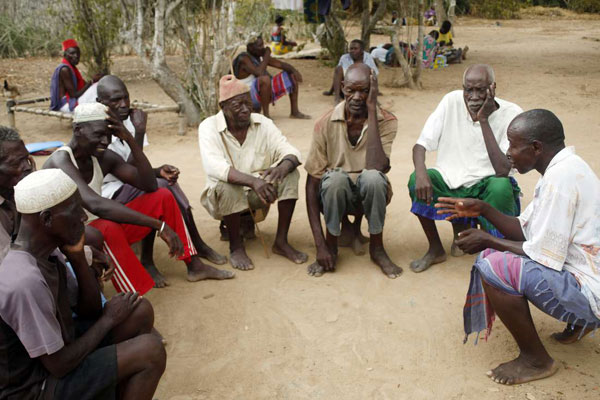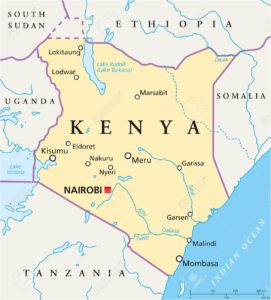Introduction – under construction

Published: April 13, 2019
By: Baya Samuel and Siago Cece
Hidden deep in the thicket, just a kilometre from Mrima wa Ndege township is Kaya Godhoma Centre, a sanctuary that has hosted tens of elders since 2008.
As we made our way in, we were stopped on our tracks, and told we had to undergo a cleansing ritual, as we were entering a cultural place.
“Let’s all stand up and form a ‘lungo’ (a traditional circle formed by a number of people gathered before prayers),” Emmanuel Katana, 45, the current chairman of the centre asked, and we all obliged.
For the next few minutes, together with the group of about 15 elders, we joined in their prayers, in Giriama dialect, thanking their gods for us, the visitors.
The prayers then ended with a handshake, signifying peace among the members. A brief introduction followed and later we were ushered inside the kaya minus our shoes, which we left at the bushy entrance.
KAYA MEETING
Looking famished, with despairing faces, several elderly persons trickled into the kaya meeting point, under a tree shade.
Some were dressed in faded shirts and torn clothes holding their three-legged stools, while supporting their thin frames with wooden walking sticks. The women, on the other hand, donning torn lesos, carried woven mats which they spread down for the rest to sit on.
Kahindi Ngoka cuts a figure of a man weighed down by worry. At 76, Mr Ngoka is bitter at how his family turned against him, as they eyed his prime land in Kilifi.
Mzee Ngoka was branded by his own wife and children a witch, before they attempted to harm him. All along, their prime target was his one-and-half-acre prime land.
WITCH
“The problem started in 2011, when my children accused me of being a witch. I defended myself, even suggesting that we go to a local witch buster called Mwasamani in Kwale County. Even when the ‘witch buster’ exonerated me, they didn’t stop,” Mr Ngoka said.
As he tried to ignore their accusations, the family upped the stakes by tricking him into a meeting at his eldest son’s house. “As soon as I entered, the doors were locked from outside and I knew that was the end. I had to act, sneaking through the thatched roof, and I escaped,” Mr Ngoka said.
What Mr Ngoka didn’t know was that a plan had already been hatched to push him out so that his land could be sold.
“Barely weeks after I escaped and came to Kaya Godhoma, I received news that part of my land had been sold and that one of my family members had gone to court to stop the sale,” Mzee Ngoka said. “I later realised that all the troubles were the plan of my wife and some of my children. They branded me a witch so that they could sell part of my land. I leave it to God,” he said.
WORRIES
Karisa Ndhudhi’s gait depicts a man burdened by worries about his life. The 63-year-old native of Konjora village in Kilifi, struggles to control his emotions, as he narrates his near death ordeal.
“I arrived here in August of 2017, having escaped death after a section of my family turned against me, branding me a witch. My problems started immediately after the death of my wife on December 24, 2013,” said Mr Ndundhi.
Immediately after her death, after a long illness, word went round that he was responsible for it, as he had bewitched her.
“Since I wanted to prove to them that I was not a witch, we went to a witchdoctor in Kwale, who exonerated me, after performing a ritual,” he said.
Thinking that he was off the hook, Mzee Ndundhi returned home, unaware that the worst was yet to come.
CHOLERA
“Four years later, in July 2017, my third born son contracted cholera, but unfortunately despite the quick medical intervention, he passed on. Hours after my son’s death, I was again accused of bewitching him and the villagers and part of my family members descended on me with stones,” he said.
As the youths stoned him, an assistant chief called officers from the nearby Ngerenya police post, who rescued the hapless old man.
“I was then taken to Chumani village where our larger family resides,” he said. “At Chumani, a decision was arrived that he must be taken to Kaya Godhoma.
“I still love my home but I fear that once I return, they will kill me. Now my land is at stake and I have heard that there is someone seeking to purchase it, with the help of my other children,” he said.
SAD TALES
Katana Thuva, 60, died a dejected bitter man. On paper, he was worth millions but in reality, he died a pauper, surrounded by elders who were also in the same predicament, offering nothing more than companionship and sad tales.
At the time of his death in October last year, Mzee Thuva owned a half-acre plot in Watamu, second row to the beach, which the current market value stands at Sh20 million.
He was also accused of practising witchcraft, even as he said his family was out to kill him, as they sought to sell his prized possession.
Mzee Ngoka and Ndhudhi’s predicament paint the sad picture facing hundreds of other elders in Kilifi and Kwale counties, which are being dispossessed off their prime land, some touching on the beaches, by money thirsty children, who want to make a quick killing from the black gold.
SOUGHT REFUGE
The elders have all sought refuge at the Kaya Godoma in Kilifi, a centre that offers them safe refuge; whiling time away, nursed by the haunted memories of their past, and the very resource they say connects them to their forefathers – land.
Within the Coastal counties, land ownership is still an emotive issue with the resource notably the cause of the killing of most elders.
In 2018, killings in Kilifi remained high with the security agencies stating that there are about 108 cases that were reported in the entire county.
Most of those we interviewed at Kaya Godhoma Rescue Centre in Vitengeni, Kilifi County connected their ordeal to land ownership.
Even with much spirited campaign from the government to end the trend, scores were killed especially in Kilifi and Kwale counties.
A report done jointly by Haki Africa and Institute for Land, Governance and Human Rights has shown that land ownership tussles were behind the killings. In an interview with Saturday Nation, Haki Africa executive director Khalid Hussein said that the report focused on the three years to 2018.
KILLED
The report shows that in 2016, 41 elderly people were killed, while in 2017, 37 lost their lives. Last year, there were around 25 old men and women who were killed. “The main thing we found from the residents is that witchcraft was being used as a trigger of forceful land inheritance, with the children becoming impatient,” Mr Hussein said.
“We are currently undertaking a programme which we are implementing with local leadership in Kilifi and Kwale counties to address this menace.”
Poverty is also said to be a contributing factor, which has driven a lot of the young people to have an insatiable appetite to sell their ancestral lands.
The report further said that most of the victims were innocent of the witchcraft accusation, but still lost their lives because of land tussles.
“When over 100 people are killed in a span of one year, then you know that there is a problem. The only thing we are doing at the moment is to raise awareness so that locals can desist from killing the elderly,” Kenya National Commission for Human Rights (KNCHR) Coast regional coordinator Brenda Dosio said.
WITCHCRAFT ACT
Ganze legislator Teddy Mwambire said he will be pushing for an amendment in Parliament to review the Witchcraft Act to cushion the elderly people from being murdered on suspicion of being sorcerers.
“The Act in its current form falls short of providing security to the aged. Ignorance is to blame for the rampant killings of the elderly in our society. People associate advanced age with witchcraft, a trend that has seen hundreds murdered. I will be seeking amendments of the Act or table another Bill altogether in parliament that will seek to cushion the elderly from such retrogressive acts,” he said.
DEEPER PROBLEMS
Mr Julius Wanyama, a Peace Programme Coordinator at Haki Yetu organisation, said “From our assessment, the witchcraft accusations against the elderly are an excuse, but a very fatal one. It’s a trigger to deeper problems within the society -that is the thirst for land and money.”
“As an organisation, we have had to seek a meeting with the county security team to address the problem. We discovered there was no ready forum to address or resolve misunderstanding and initiated a programme called ‘Wapatanishi’ (local interveners), who have helped especially when they of the targets. So far they have managed to save 20 in Kilifi County and 10 in Kwale who are currently living in their homes without fear of being killed.”
Source: Kenya: Witchcraft tales in thirst for land put elders lives at risk

